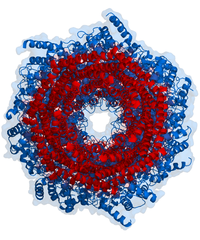
Photo from wikipedia
Ubiquitin Specific Protease-13 (USP13) promotes protein de-ubiquitination and is poorly understood in neurodegeneration. USP13 is upregulated in Alzheimer’s disease (AD) and Parkinson’s disease (PD), and USP13 knockdown via shRNA reduces… Click to show full abstract
Ubiquitin Specific Protease-13 (USP13) promotes protein de-ubiquitination and is poorly understood in neurodegeneration. USP13 is upregulated in Alzheimer’s disease (AD) and Parkinson’s disease (PD), and USP13 knockdown via shRNA reduces neurotoxic proteins and increases proteasome activity in models of neurodegeneration. We synthesized novel analogues of spautin-1 which is a non-specific USP13 inhibitor but unable to penetrate the brain. Our synthesized small molecule compounds are able to enter the brain, more potently inhibit USP13, and significantly reduce alpha-synuclein levels in vivo and in vitro. USP13 inhibition in transgenic mutant alpha-synuclein (A53T) mice increased the ubiquitination of alpha-synuclein and reduced its protein levels. The data suggest that novel USP13 inhibitors improve neurodegenerative pathology via antagonism of de-ubiquitination, thus alleviating neurotoxic protein burden in neurodegenerative diseases.
Journal Title: Metabolites
Year Published: 2021
Link to full text (if available)
Share on Social Media: Sign Up to like & get
recommendations!